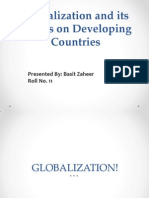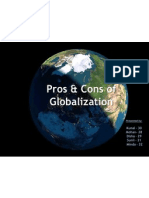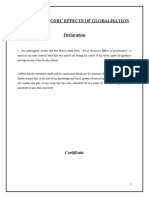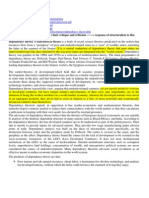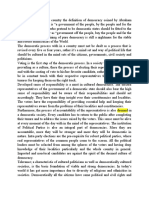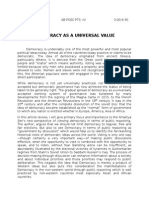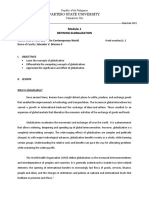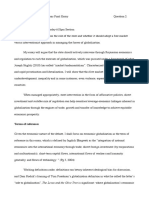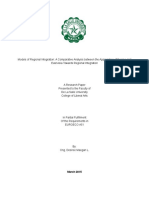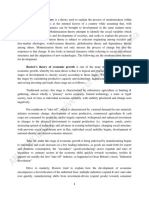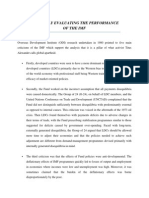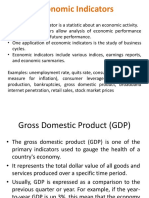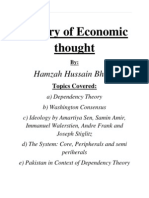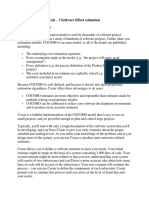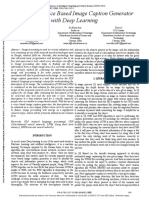Globalization: Prospects and Problems
Globalization: Prospects and Problems
Uploaded by
Rohan FarabiCopyright:
Available Formats
Globalization: Prospects and Problems
Globalization: Prospects and Problems
Uploaded by
Rohan FarabiOriginal Title
Copyright
Available Formats
Share this document
Did you find this document useful?
Is this content inappropriate?
Copyright:
Available Formats
Globalization: Prospects and Problems
Globalization: Prospects and Problems
Uploaded by
Rohan FarabiCopyright:
Available Formats
Globalization: Prospects and Problems
Introduction: Globalization is currently a fashionable topicsome laud it, claiming that it is the path to peace, prosperity and progress. Others abhor it, attributing to it many evils in world affairs including polarization, environmental destruction, cultural degradation, and so forth. In fact, globalization can be described as a fast moving train that waits for nobody. Intended passengers either jump onto it or risk of being left behind. What is Globalization? Globalization is the process of integrating nations and peoplespolitically, economically, and culturallyinto a larger community. It basically refers to a process that enables people, goods, information, norms, practices and institutions to transcend national jurisdictions through markets, technologies, interests and information flows. It is gradually turning the world into a single and integrated entity with borders. Three main dimensions of globalization areEconomic Dimensions: Economic globalization is a process by which the economies of the world become increasingly integrated, leading to global economy and, increasingly, global economic policymaking. Socio-cultural Dimensions: Social globalization means processes whereby many social relations become relatively delinked from territorial geography, so that human lives are increasingly played out in the world as a single place. Cultural globalization refers to an emerging global culture, in which people more often consume similar goods and services, share and adopt several cultures of other nations being interconnected by means of TV, business, tourism and presence of the internet. Political Dimensions: Political globalization refers to an increasing trend toward multilateralism, toward an emerging transnational state apparatus, and toward the emergence of national and international nongovernmental organizations that act as watchdogs over governments and have increased their activities and influence. Historical Development: Globalization has been a historical process with ebbs and flows. During the Pre-World War I period of 1870 to 1914, there was rapid integration of the economies in terms of trade flows, movement of capital and migration of people. There were fewer barriers to flow of trade and people across the geographical boundaries. Indeed there were no passports and visa requirements and very few non-tariff barriers and restrictions on fund flows. The pace of globalization, however, decelerated between the First and the Second World War. The interwar period witnessed the erection of various barriers to restrict free movement of goods and services. Most economies thought that they could thrive better under high protective walls. After World War II, all the leading countries resolved not to repeat the mistakes they had committed previously by opting for isolation. In the last two decades, the process of globalization has proceeded with greater vigor. More and more developing countries are turning towards outward oriented policy of growth.
The positive impact of globalization: Globalization has many positive, innovative and dynamic aspects, all related to the increased market access, increased access to capital, and increased access to technology and information which have led to greater income and employment opportunities. This process integrates people, businesses, nongovernmental organizations, and nations into larger networks. Globalization promotes convergence, harmonization, efficiency, growth, democratization and homogenization. There is no dearth of examples: The world as a whole is definitely more prosperous and more healthy, with average per capita incomes tripling in the last fifty years, child mortality rates halving and life expectancy increasing by ten years since 1965.Trade flows also increased 12-fold in the past fifty years as a result of the removal of natural and artificial barriers. As national economies become more homogeneous and more integrated with the outside world, people are moving across national boundaries in unprecedented numbers and frequency. A rising population in less-developed areas frequently has triggered emigration to areas of economic opportunity, and this in turn has frequently produced a stream of remittances to family members who remained behind. Tourists, business people, artists, researchers, educators, students, and even bureaucrats are increasingly seeking opportunities outside their home countries; as a result, people from different countries are getting to know each other and exchange views and ideas, often becoming friends and collaborators. The human network is broadening and deepening with the passage of time. Enhanced by international media, people across national boundaries have begun to share similar views, aspirations, and even similar heroes and idols. People are talking about similar topics, dressing according to similar codes, eating similar foods, sharing similar dreams, and protesting against similar evils, as if the world were a single community. The negative impact of globalization: While the world as a whole has benefited from globalization, there are some negative and marginalizing aspects of globalization1. Unbalanced Distribution of Benefits: The first negative aspect of globalization is that its gains are not equally distributed, both between and within countries. Indeed, many of the gains have been going to the rich nations or individuals, creating greater inequalities and leading to potential conflicts nationally and internationally. While the world has shrunk into a global village, the gap between the rich and the poor in that village is widening. While billionaires grow in number, millions of people find themselves out of jobs and many without food, shelter or medical care. The information and communication technology revolution, which is regarded as the newest sinew of globalization, has created a gap of its own the so-called digital divide. 2. Financial Volatility: Globally integrated markets have financial volatility as a permanent feature, the frequency of financial crisis increasing with the growth in international capital flows. The human costs of such financial volatility can be very high, as shown by the effects of the Asian crisis bankruptcies, poverty increase, rising unemployment, reduced schooling, reduced public services, and increased social stress and fragmentation in short, a reversal in human development.
3. Contagion: The closer linkages that characterize globalization also allow for contagion and worldwide recession, or at least slowdown. The Asian crisis and the recent global recession had repercussions everywhere in South America, Russia, Africa, the Middle East which were affected either directly or indirectly. 4. More human insecurity: Unfortunately, the many opportunities opened up by the widening and deepening of information flows and contacts among the worlds people also include increasing opportunities for crime (trafficking in drugs, weapons, women, international syndicates), for the spread of HIV/AIDS as well as ideas, and for the flow of culture and cultural products which may lead to cultural homogenization, which, while considered enriching by some, is considered as a loss of cultural identity by others. 5. Impacts on political developments: The development of globalization has wide-ranging impacts on political developments, which particularly go along with the decrease of the importance of the state. Through the creation of sub-state and supra-state institutions such as the EU, the WTO, the G8 or the International Criminal Court, the state loses power of policy making and thus sovereignty. Many also worry about a growing concentration of economic power; harm to the environment; danger to public health and safety; and the loss of accountability, and transparency in government. 6. Ecological Destruction: Globalization has also done nothing to relieve the hazards of ecological destruction. As developed countries strengthen environmental regulations, multinational corporations move their polluting factories to developing countries. Meanwhile, third world countries struggling for development are more and more accommodating to the demands of the multinational corporations in order to attract and keep their investments. Consequently, ecological destruction continues and intensifies, only in a different locale. Globalization and Bangladesh: Globalization has many meanings depending on the contexts. In context to Bangladesh it implies opening up the economy to foreign direct investment by providing facilities to foreign companies to invest in different fields of economic activity in Bangladesh, removing constraints and obstacles to the entry of Multinational Corporations (MNCs) in Bangladesh, allowing Bangladeshi companies to enter into foreign collaborations and also encouraging them to set up joint ventures abroad, carrying out massive import liberalization programs by switching over from quantitative restrictions to tariffs and import duties. After a hesitant start in the mid-1980s, Bangladesh moved decisively to embrace the wave of globalization in the 1990s. Prospects of globalization: Globalization merely provides opportunities to flourish. Therefore developing countries require focusing on economic restructuring and developing market-supporting institutions. To get a share of global capital, technology and output, developing countries had to upgrade their social and economic institutions through administrative, legislative and legal reforms. Under the phenomenal growth of information technology which has shrunk space and time and reduced the cost of moving information, goods and capital across the globe, the globalization has brought unprecedented opportunities for human development for all, in developing as
well as developed countries. Our government should pay immediate attention to ensure rapid development in education, health, water and sanitation, labor and employment. A strong foundation of human development of all people is essential for the social, political and economic development of the country. The government should take immediate steps to increase agricultural production and create additional employment opportunities in the rural parts, to reduce the growing inequality between urban and rural areas and to decentralize powers and resources for implementing all works for rural development. It should be remembered that without a sustainable and productive growth of the agricultural sector, the other types of development in any sphere will be unstable and illusory. Conclusion: Globalization has appeared as an inescapable reality. It is not a tool to produce equality of outcome but it produces equality of opportunity for those with right mindset. Globalization should not be accused for loosing share of the low income countries. These countries suffered from internal problems like rapid rise in population, infrastructures bottlenecks, weak financial markets and so on. Globalization just requires vigilance and the rule of law. As more money is poured into developing countries there is a greater chance for the people in those countries to economically succeed and increase their standard of living.
You might also like
- Pricing PDFDocument113 pagesPricing PDFmmanoNo ratings yet
- GlobalizationDocument10 pagesGlobalizationAkinpelu 'Daewoo' AdewunmiNo ratings yet
- Globalization and Its Effects On Developing CountriesDocument29 pagesGlobalization and Its Effects On Developing CountriesBasit ZaheerNo ratings yet
- Features of GlobalizationDocument4 pagesFeatures of Globalizationrumahbianglala50% (2)
- Free Trade and ProtectionismDocument12 pagesFree Trade and ProtectionismPrakshi Aggarwal100% (1)
- Globalisation-Pros & ConsDocument22 pagesGlobalisation-Pros & Conskunalworksmart50% (2)
- Impact of COVID-19 On GlobalisationDocument27 pagesImpact of COVID-19 On GlobalisationSnehaNo ratings yet
- GlobalizationDocument7 pagesGlobalizationmnm000111No ratings yet
- Assignment On GlobalizationDocument17 pagesAssignment On GlobalizationAbdullah IzamNo ratings yet
- Globalization Pros and Cons ListDocument2 pagesGlobalization Pros and Cons ListAna MaríaNo ratings yet
- Lesson 3 - Sociological Research MethodsDocument31 pagesLesson 3 - Sociological Research MethodsRajesh DharamsothNo ratings yet
- Economic Impact of CovidDocument7 pagesEconomic Impact of Covidrishi pereraNo ratings yet
- Effect of Globalization and How It Affects Form A National Security PerspectiveDocument13 pagesEffect of Globalization and How It Affects Form A National Security PerspectivejebergNo ratings yet
- Luthans IM 11e Chapter05Document26 pagesLuthans IM 11e Chapter05Huynh Minh Tien (K16HCM)No ratings yet
- Globalization: Herenshenne G. Bolor BSA 1-5Document7 pagesGlobalization: Herenshenne G. Bolor BSA 1-5Shopee ShaneNo ratings yet
- On Francis FukuyamaDocument54 pagesOn Francis FukuyamaChris Hughes100% (1)
- Colin Hay GlobalizationDocument23 pagesColin Hay GlobalizationAshleigh CurdNo ratings yet
- The Effects of Globalization On World EconomiesDocument55 pagesThe Effects of Globalization On World EconomiesNeptün Oral100% (1)
- Theories of GlobalizationDocument16 pagesTheories of GlobalizationolaobembeNo ratings yet
- Pol318 Political Behavior PDFDocument85 pagesPol318 Political Behavior PDFDaramola Olanipekun EzekielNo ratings yet
- Argumentative EssayDocument1 pageArgumentative EssayMicca RumponeNo ratings yet
- Diverse Structures of Developing NationsDocument22 pagesDiverse Structures of Developing NationsFaisal AhmedNo ratings yet
- Social Economic Effects of Globalisation Declaration: CertificateDocument21 pagesSocial Economic Effects of Globalisation Declaration: CertificategirishaNo ratings yet
- Europian UnionDocument24 pagesEuropian Unionsagar Maharana100% (1)
- The New World OrderDocument8 pagesThe New World OrderNicolas MarionNo ratings yet
- Pestle For MexicoDocument2 pagesPestle For MexicoParesh Ramanlal33% (3)
- Role of Diplomacy in International PoliticsDocument3 pagesRole of Diplomacy in International PoliticsDibakar BhattacharjeeNo ratings yet
- New Trends in International TradeDocument18 pagesNew Trends in International TradeAsya KnNo ratings yet
- The Process of Globalization and Its Impacts On International Business ActivitiesDocument8 pagesThe Process of Globalization and Its Impacts On International Business ActivitiesIga_Dan100% (1)
- The Cold War and The Division of Europe - Marshall Plan Case StudyDocument11 pagesThe Cold War and The Division of Europe - Marshall Plan Case StudybinsalweNo ratings yet
- The Theory of Hegemonic Stability - Central IdeaDocument2 pagesThe Theory of Hegemonic Stability - Central IdeaShabnamNo ratings yet
- LESSON 2 - Strictures of GlobalizationDocument26 pagesLESSON 2 - Strictures of GlobalizationREY PERODEZNo ratings yet
- Devlopment and DependencyDocument7 pagesDevlopment and Dependencygangadhar119No ratings yet
- Does Federalism Make Sense For The Philippines?: I Write About Philippine Economy and Government PolicyDocument9 pagesDoes Federalism Make Sense For The Philippines?: I Write About Philippine Economy and Government PolicyKrisha FayeNo ratings yet
- The World Bank and Its CriticsDocument14 pagesThe World Bank and Its CriticsNayana SinghNo ratings yet
- Washington ConsensusDocument17 pagesWashington ConsensusJuanMartinPiaggioNo ratings yet
- What Is The Driving Force of Globalization?Document11 pagesWhat Is The Driving Force of Globalization?Shamim HosenNo ratings yet
- PopulismDocument38 pagesPopulismAbdullah MuhammadNo ratings yet
- The International Monetary System and The CaseDocument35 pagesThe International Monetary System and The CaseLucianaNo ratings yet
- Influential Factors of International Business and International Business EnvironmentDocument16 pagesInfluential Factors of International Business and International Business EnvironmentAnkit Jethani88% (17)
- DemocracyDocument23 pagesDemocracyZeeshan Chaudhary100% (1)
- Democracy As A Universal ValueDocument3 pagesDemocracy As A Universal ValueJay Pow100% (1)
- Module1 Defining GlobalizationDocument10 pagesModule1 Defining Globalizationjune brionesNo ratings yet
- School Essay On GlobalizationDocument10 pagesSchool Essay On GlobalizationCheow Xin YiNo ratings yet
- NikeDocument2 pagesNikemysteriousleoNo ratings yet
- Models of Regional Integration: ASEAN vs. EUDocument15 pagesModels of Regional Integration: ASEAN vs. EUchinnydes50% (2)
- Modernization Theories of Development AnDocument6 pagesModernization Theories of Development AnAulineu BangtanNo ratings yet
- The World Bank and IMF in Developing Countries: Helping or Hindering? International Journal of African and Asian Studies. Vol. 28, 2016Document12 pagesThe World Bank and IMF in Developing Countries: Helping or Hindering? International Journal of African and Asian Studies. Vol. 28, 2016Mauricio GamNo ratings yet
- Chile Anatomy of An Economic Miracle, 1970-1986Document3 pagesChile Anatomy of An Economic Miracle, 1970-1986alexandrosminNo ratings yet
- United Kingdom Public AdministrationDocument19 pagesUnited Kingdom Public AdministrationNa ndiqni ne Facebook PUNIME SHKENCORENo ratings yet
- Multinational Corporations DevelopmentDocument10 pagesMultinational Corporations DevelopmentfysallNo ratings yet
- Soft Power Amidst Great Power CompetitionDocument9 pagesSoft Power Amidst Great Power CompetitionThe Wilson CenterNo ratings yet
- The Priorities of Economic DiplomacyDocument16 pagesThe Priorities of Economic DiplomacyNatalita RucavitaNo ratings yet
- Theories of GlobalizationDocument18 pagesTheories of GlobalizationAkazukin AineNo ratings yet
- Critical Evaluation - Role of The ImfDocument8 pagesCritical Evaluation - Role of The Imfsimonebandrawala9No ratings yet
- Public OpinionDocument4 pagesPublic OpinionuzairNo ratings yet
- Economic IndicatorsDocument10 pagesEconomic Indicatorss.r.100% (1)
- Dependency Theory and PakistanDocument30 pagesDependency Theory and PakistanHamzah Bhatti71% (7)
- Structures of GlobalizationDocument47 pagesStructures of GlobalizationJohn Lowell Bejasa0% (1)
- Economic Crisis: World Food System - The Battle against Poverty, Pollution and CorruptionFrom EverandEconomic Crisis: World Food System - The Battle against Poverty, Pollution and CorruptionNo ratings yet
- Sierra Leone Private Investment and Financial Sector Development: Trends and StatisticsFrom EverandSierra Leone Private Investment and Financial Sector Development: Trends and StatisticsRating: 5 out of 5 stars5/5 (1)
- Family Members of EU, EEA or CH Citizens Shall Not Fill in Fields No.21, 22, 30, 31 and 32 (Marked With )Document4 pagesFamily Members of EU, EEA or CH Citizens Shall Not Fill in Fields No.21, 22, 30, 31 and 32 (Marked With )sivhongNo ratings yet
- Theory of State BudgetsDocument15 pagesTheory of State BudgetsWyrlo Binamira Dela CruzNo ratings yet
- Why and How Do I Get Into Machine Learning Development?Document3 pagesWhy and How Do I Get Into Machine Learning Development?AneelaMalikNo ratings yet
- UNIT5 LISTEN GapYear-Work Exercise1 PDFDocument1 pageUNIT5 LISTEN GapYear-Work Exercise1 PDFRachel LopezNo ratings yet
- SYLLABUS-Cost & Management AccountingDocument3 pagesSYLLABUS-Cost & Management AccountinglakshmiNo ratings yet
- ME 399-Summer TrainingDocument1 pageME 399-Summer TrainingESK ChannelNo ratings yet
- Effects On LandformsDocument3 pagesEffects On LandformsRetxed Narnola Subiaga0% (1)
- SJST Manuscript Template For A Text FileDocument8 pagesSJST Manuscript Template For A Text Filemarut1999No ratings yet
- Speech AnalysisDocument1 pageSpeech AnalysisRanjika Basu MajumdarNo ratings yet
- x12 Special Charge CodesDocument36 pagesx12 Special Charge CodesOcean PulseNo ratings yet
- A Short Presentation of Marketing StrategyDocument10 pagesA Short Presentation of Marketing StrategyLuca CristinaNo ratings yet
- Primary Year 2 Scheme of Work PhonicsDocument37 pagesPrimary Year 2 Scheme of Work PhonicsNurhidayah JunaidahNo ratings yet
- Staffing The Engineering OrganizationDocument6 pagesStaffing The Engineering OrganizationReden LopezNo ratings yet
- AE942 Spacecraft Design Rev 1.1Document4 pagesAE942 Spacecraft Design Rev 1.1Ali Sarosh100% (1)
- Lesson 2 Suheil PDFDocument14 pagesLesson 2 Suheil PDFrusilawati salleh100% (1)
- Social InfluenceDocument26 pagesSocial Influenceattique100% (2)
- Catriona PollardDocument15 pagesCatriona PollardDR-Nizar DwaikatNo ratings yet
- Effects of Packaging DesignDocument12 pagesEffects of Packaging Designkimmelody oliquiano0% (1)
- Lecture2 Identification PDFDocument41 pagesLecture2 Identification PDFMohammad RizqaNo ratings yet
- Res ShowDocument37 pagesRes ShowPrasobh ASNo ratings yet
- Socialism in The Contemporary WorldDocument11 pagesSocialism in The Contemporary WorldAmaaan KhanNo ratings yet
- Unit-3 Overview of COCOMODocument5 pagesUnit-3 Overview of COCOMOMs.Manisha ShindeNo ratings yet
- Building A Voice Based Image Caption Generator With Deep LearningDocument6 pagesBuilding A Voice Based Image Caption Generator With Deep LearningPallavi BhartiNo ratings yet
- Smart Goal PDFDocument12 pagesSmart Goal PDFChaNo ratings yet
- UNDP CIPS Training Catalogue 2019 PDFDocument20 pagesUNDP CIPS Training Catalogue 2019 PDFBùi Duy Tây0% (1)
- ESAP - Diagnostic Report On Undeclared Work - AL - Dec2018 PDFDocument93 pagesESAP - Diagnostic Report On Undeclared Work - AL - Dec2018 PDFCiprianNo ratings yet
- ClintDocument3 pagesClintMary Jane SaladinoNo ratings yet
- SebastianDocument2 pagesSebastianapi-446767190No ratings yet
- BEDNAR - Catalog PieseDocument29 pagesBEDNAR - Catalog PieseAnonymous 1XBCMXNo ratings yet


